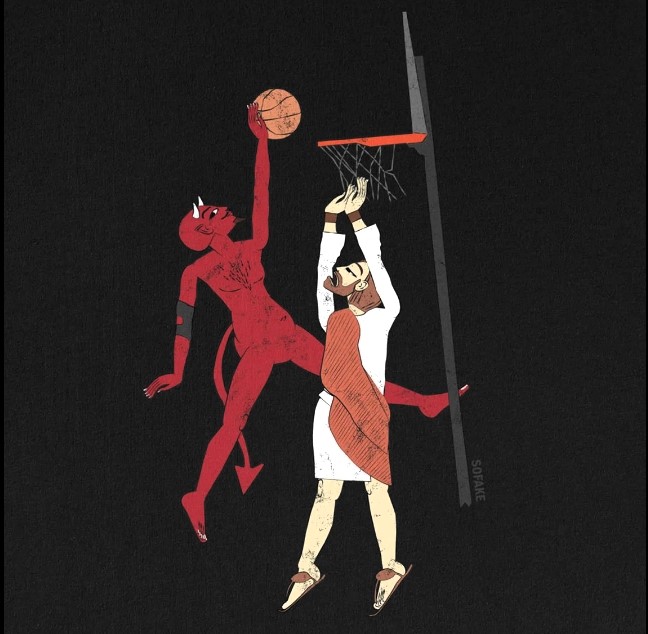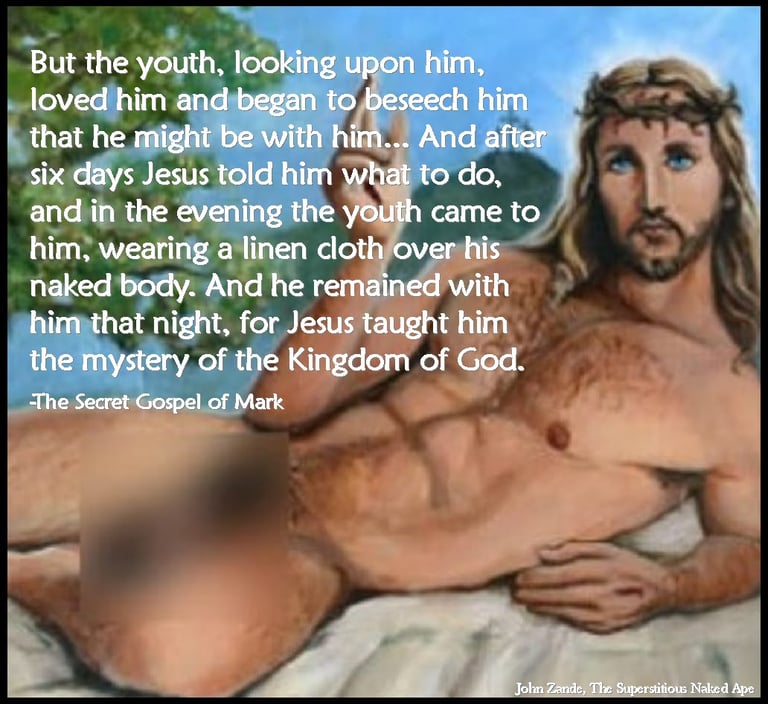The Battleground:
You all know the scene: a vast, arid desert stretching endlessly under a scorching sun. The harsh conditions would have tested anyone's resolve. Yet, this is where Jesus found himself, alone and vulnerable. Traditional narratives highlight his steadfastness, but let’s consider another angle. Perhaps the isolation of the desert became a meeting ground—not just for temptation—but for enlightenment and revelation.
Now, Jesus Was Social AF and saw plenty of action prior to this arid rendezvous. The Gospels confirm over and over that Jesus was always in someone’s house, eating, drinking, and vibing. Whether it was with tax collectors (scandalous), women of questionable reputation (gasp!), or large crowds looking to be fed — Jesus didn’t avoid a good time. In fact, his first public miracle was at a wedding party. Not a temple. Not a lecture hall. A damn wedding. And what did he do? He made *premium wine* after everyone was already lit. You know how hard it is to impress drunk people with wine? That’s a power move.
“Glutton and Drunkard” Wasn’t an Empty Insult and yet it must've played a part during that conference. A conversation like that?! Yeah, pass the wine, buddy.
Religious elites called him a “glutton and a drunkard” (Luke 7:34), not because he was actually a sloppy mess — but because he was *too comfortable* around people they considered unclean. Think about it: if your Messiah is more at ease chillin’ with prostitutes and throwing back cups of wine than with the high priests and their holier-than-thou rituals, of course the religious establishment is gonna be pissed. It was shade, but that shade was rooted in something.
And in this dusty solitude, Jesus wasn’t wrestling with hunger alone; he was grappling with ideas, visions, and perhaps even doubts. It’s here, in this stark landscape, that Satan, in his angelic form, might have approached. The conversation wouldn’t be one marked by anger or malice, but possibly one full of reason, insight and personal accounts with the "Most High".
A Glimpse into Heaven and Hell
Satan, once known as Lucifer—the Light-Bringer—was not merely an adversary but a figure steeped in experience. He was privy to the inner workings of the heavenly realm, having been one of the chief angels before his fall. So, when he encountered Jesus, it wasn't an attempt to sway him away from his divine mission, it was a looooong overdue pow-wow that Satan may have wanted to get "off his chest" for eons.
I digress...apologies. Anyhow: imagine Satan sharing tales of their mutual acquaintance—God. Picture a friendly discourse where Lucifer recounts the glory days when he and God were inseparable. "I know Him better than anyone," he could have said to Jesus. "Let me tell you about the layers of His nature, the complexities of our relationship." This alternative narrative shifts from one of temptation to one of intellectual exploration, possibly captivating Jesus like a child enamored by a bedtime story.
There's a strong probability that Jesus was fascinated. Asking difficult and intricate questions that Jesus knew God wouldn't answer. I mean it's no secret that God is fickle to say the least. No one would like a bully for a parent, but Jesus just may have happily been a glutton for punishment. Who really knows.




Jesus faced not only the physiological urge of hunger but also the philosophical quandaries posed by Satan. "Isn’t it time to question everything?" Satan might have prompted. This was not merely about refusing physical sustenance; it was about the hunger for wisdom, knowledge, and deeper understanding. Could it be that in those 40 days, Jesus and Satan engaged in philosophical debates that shaped the foundation of Jesus' teachings?
A New Perspective on Divine Purpose
As the days stretched on, we can imagine a shift taking place. Instead of feeling ensnared by temptation, Jesus might have begun to see the value in questioning authority, in exploring the very nature of divinity itself. This dialogue could have fostered a sense of empathy within him, enlightening him about the struggles not just of humanity, but of celestial beings too.
In this interpretation, Satan’s role morphs from villain to a catalyst for transformation. Jesus might have walked away from his isolation not just fortified against physical temptations but emboldened by a profound understanding of his mission. One that included love, forgiveness, and a more authentic connection to both God and his fellow humans. Being wayward for 18 years had prepped him for this encounter. Many biblical cherry-pickers happily gloss over Jesus' entire 20s and teenage years. . .
The Nature of Temptation: Not Just About Indulgence
In traditional teachings, Satan presents physical temptations—turning stones to bread, leaping from high places, and ruling kingdoms. However, let’s think deeper. What if the true essence of temptation lay not just in the material offers but in the ideas themselves? In this version, Satan might have illuminated the flaw in strict adherence to rules without understanding the heart behind them.
Jesus wasn’t a sucker. He wasn’t a bland, overly serious sermon-on-the-mount bot. He was fully alive — probably reckless in his youth, maybe sexy, definitely social, and unapologetically human before he leaned into the divine. To say he never partied is to deny the radical relatability of his story. To say he only came to suffer is to flatten his humanity. Whether or not you see him as God, rebel rabbi, or spiritual influencer — Jesus lived. And he was probably loud af!
The Legacy of a Different Story
At the end of the day, whether we view this experience as a battle or a conversation, it remains a pivotal part of our spiritual history, asking us to explore our own beliefs about authority, divinity, and the human condition. So, next time you reflect on those 40 days in the desert, remember: there’s always more than one story waiting to be uncovered.
What Was He Doing From 12 to 30?
This is another big mystery — and the Church mostly sidesteps it. Ahem, you mean to tell us that for 18 years, nothing notable happened in the life of the literal Son of God? Come on. Either he was: Living a whole-ass life, making mistakes, falling in love, partying, seeing the world, learning from it, getting messy — before stepping into his calling or we’ve been intentionally denied the raw, unfiltered reality of who he was in that crucial, formative period. Which do you think is more likely? Duh.
The Secret Gospel of Mark implies homoerotic undertones or at least intense emotional intimacy with young men. Whether that’s literal or symbolic, it pushes against the buttoned-up, asexual saint image that's been carefully curated over the centuries. His presence in those spaces was intentional. He met people as they were, where they were most comfortable. He broke bread not just for nourishment, but to create communion. And he didn’t avoid “the wrong crowd” — he centered them because his ministry wasn’t cloistered and exclusive — it was messy, intimate, and wildly inclusive. The son of God was in fact seasoned and not just some naive, gentle lamb.
Anyways, what really most likely happened out there in that desolate desert? Did Jesus heroically reject all temptation, or did he engage in a rich exchange of ideas that expanded his understanding of the world and his purpose within it? By allowing ourselves to entertain this alternative narrative, we delve into the complexities of faith, temptation, and understanding. It's a reminder that spiritual journeys are rarely straightforward; they are messy, complicated, and filled with instances of doubt and clarity alike.








